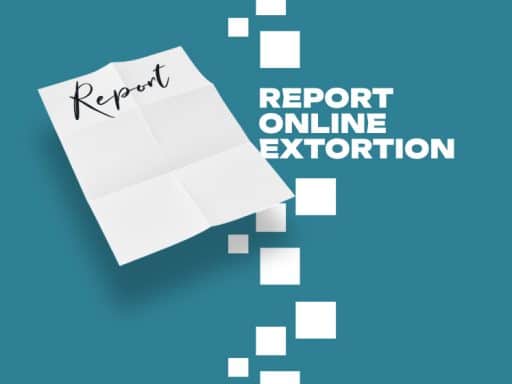Cybercrimes related to explicit images continues rising, shattering the privacy and dignity of a victims. But these factors are currently being misrepresented by law enforcement as many agencies combine the crimes of Revenge Porn and Sextortion as though they were the same offense.
This is a mistake that leads to issues in how these different crimes are pursued. Throughout this article, we will explore the differences between Revenge Porn vs. Sextortion.
While they both exploit personal, private content, their motives and repercussions are radically distinct. One is a cybercrime perpetrated by different criminal organizations, while the other is an act of cyber harassment an act of petty revenge.
What is the difference between Sextortion & Revenge Porn?
Sextortion is a form of financial extortion, while revenge porn is a type of cyber harassment. The United States, European Union, and Australia classify these crimes in this way, creating distinct differences in how they are prosecuted by law enforcement and the stigmas associated with falling prey to the crime.
Key Differences Between Revenge Porn and Sextortion.
Let’s highlight some of these key differences in greater detail.
Revenge Porn
- The Perpetrator: More often, this is an ex-partner or someone who that partner is affiliated with.
- Motive: To humiliate, shame, or emotionally hurt the victim, as an act of revenge. In most cases, the victims are not aware of their images being leaked and are only informed once one of their friends or family members discovers the images online.
- Typical Source of the Leak: These images of videos are often placed on different platforms including porn distributors or social blogs like Tumblr where revenge porn content is not monitored well.
- Legal Framework: In most countries, it’s considered a crime of abuse or privacy violation. Many countries and states have introduced laws that are specifically aimed at preventing the non-consensual sharing of intimate images often called “revenge porn laws.”(1)
- Role of Consent: The intimate material was probably shared consensually in the past without coercion via catfishing. However, if the victim did not give consent for the images to be shared with anyone else, the act of sharing the content would be considered illegal
- Impact on the Victim: The most obvious impact would be the reputational and emotional harm to the victim; some victims may even be subject to harassment by viewers who observe their content where it is posted.
Sextortion
- The Perpetrator: These are strangers or cybercriminals using fraudulent digital personas designed to catfish the victim.
- Motive: The criminal seeks to extort money from the victim. Using the fear of exposure the criminal will promise to delete the content if the victim pays them, though this is normally a tactic to create compliance with additional demands.
- Typical Source of the Leak: Most cyber blackmailers that conduct sextortion scams will threaten to release the content to the victim’s connections on different social platforms. They’ll create group messages with the threat of clicking send if not paid.
- Legal Framework: Extortion or any other acts that are classified as extortion are considered illegal in virtually every country. It is universally recognized as a crime because it violates basic principles of personal rights. As a result, many countries have specific sextortion laws and agencies created to combat sextortion. (2)
- Role of Consent: Since the images were obtained through fraud and coercion, the criminal does not have any rights to the images.
- Impact on the Victim: Emotional distress, financial loss, and in some severe instances, complete loss of reputation and career.

What Can You Do As A Victim?
The victim of revenge porn needs to collect evidence of threats in the form of screenshots or links to leaked content. Most law enforcement agencies can take immediate action if the victim can provide proof that the perpetrator was responsible for the leaking of the victim’s content. If they cannot provide significant proof that the ex-partner was responsible for the leak, the victim will want to consult with a cyber security firm that can investigate the leak and adequate proof.
Those targeted by sextortion should record all communication and report incidents to the local police and respective agencies for cybercrime. In many cases, sextortion involves jurisdictional issues. This is because most sextortion cases targeting victims in the US, EU, and AU are carried out by cybercriminals in Asian, African, or Latin American countries.
But no matter how dire the situation may seem, it is possible to navigate this awful time by being gentle with yourself and seeking support from those closest to you. Do not blame yourself. You might feel foolish for having trusted another person with the sexual content. Regardless of whether you voluntarily sent the images; the fault lies with the criminal who leaked the content.
How Digital Forensics Helps Victims of Either Crime
Are you a victim of a cybercrime like what’s been described in this article? Our team of cyber security experts can act on your behalf to help you fight back. We use advanced technologies such as IP-to-location tracking to identify and confront the perpetrators on your behalf. This combined with our effective content removal practices helps ensure that any removed content does not reappear.
If you’re a victim of sextortion, please gather as much evidence as possible and reach out to our cyber security team by calling our 24/7 Sextortion Helpline. If you’re facing revenge porn, collect all relevant information including the names of the sites or apps where the content was leaked, and contact our dedicated cyber harassment team.
No matter what kind of cyber attack you’re dealing with, Digital Forensic is here to help you feel safe and secure again during this difficult journey.
Sources:
DISCLAIMER: THIS POST IS FOR INFORMATIONAL PURPOSES ONLY AND IS NOT TO BE CONSIDERED LEGAL ADVICE ON ANY SUBJECT MATTER. DIGITAL FORENSICS CORP. IS NOT A LAWFIRM AND DOES NOT PROVIDE LEGAL ADVICE OR SERVICES. By viewing posts, the reader understands there is no attorney-client relationship, the post should not be used as a substitute for legal advice from a licensed professional attorney, and readers are urged to consult their own legal counsel on any specific legal questions concerning a specific situation.





